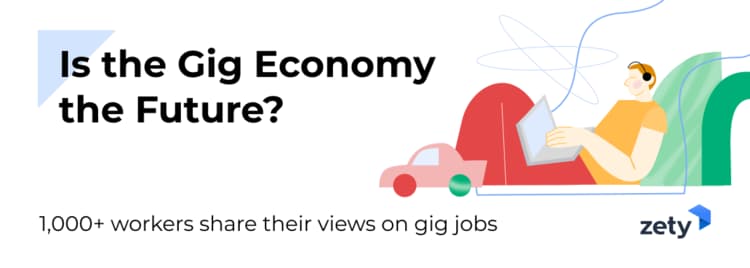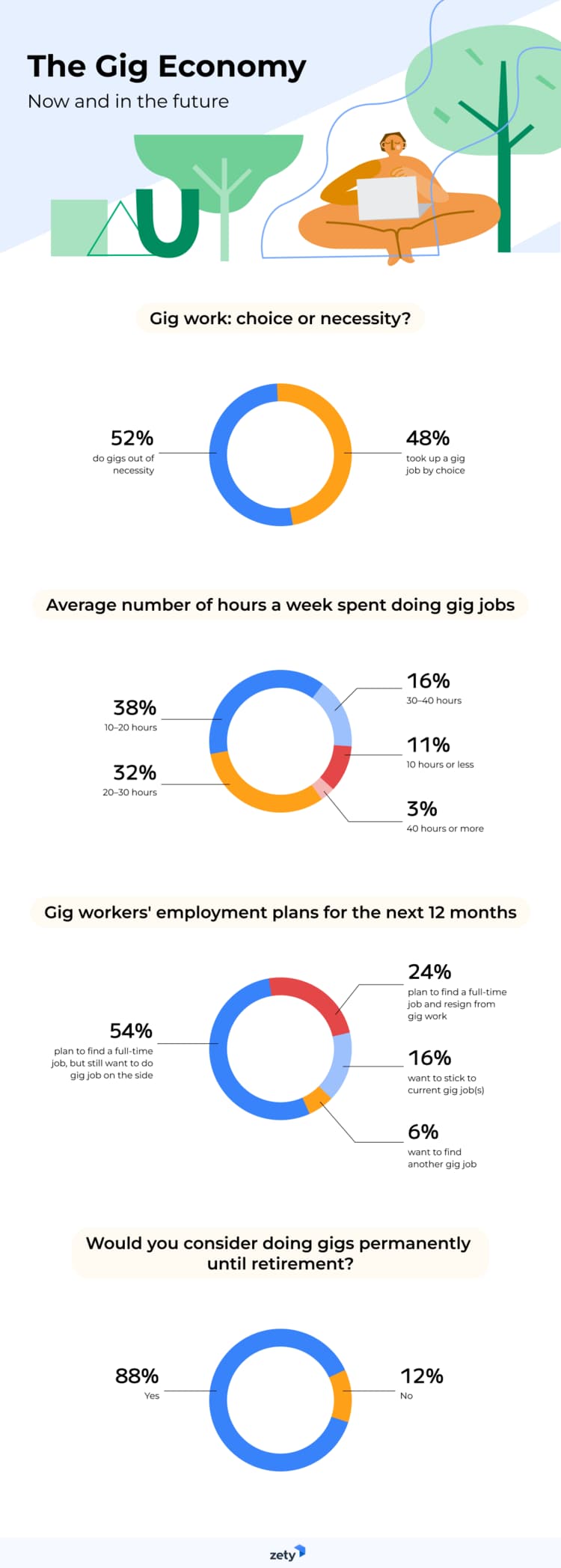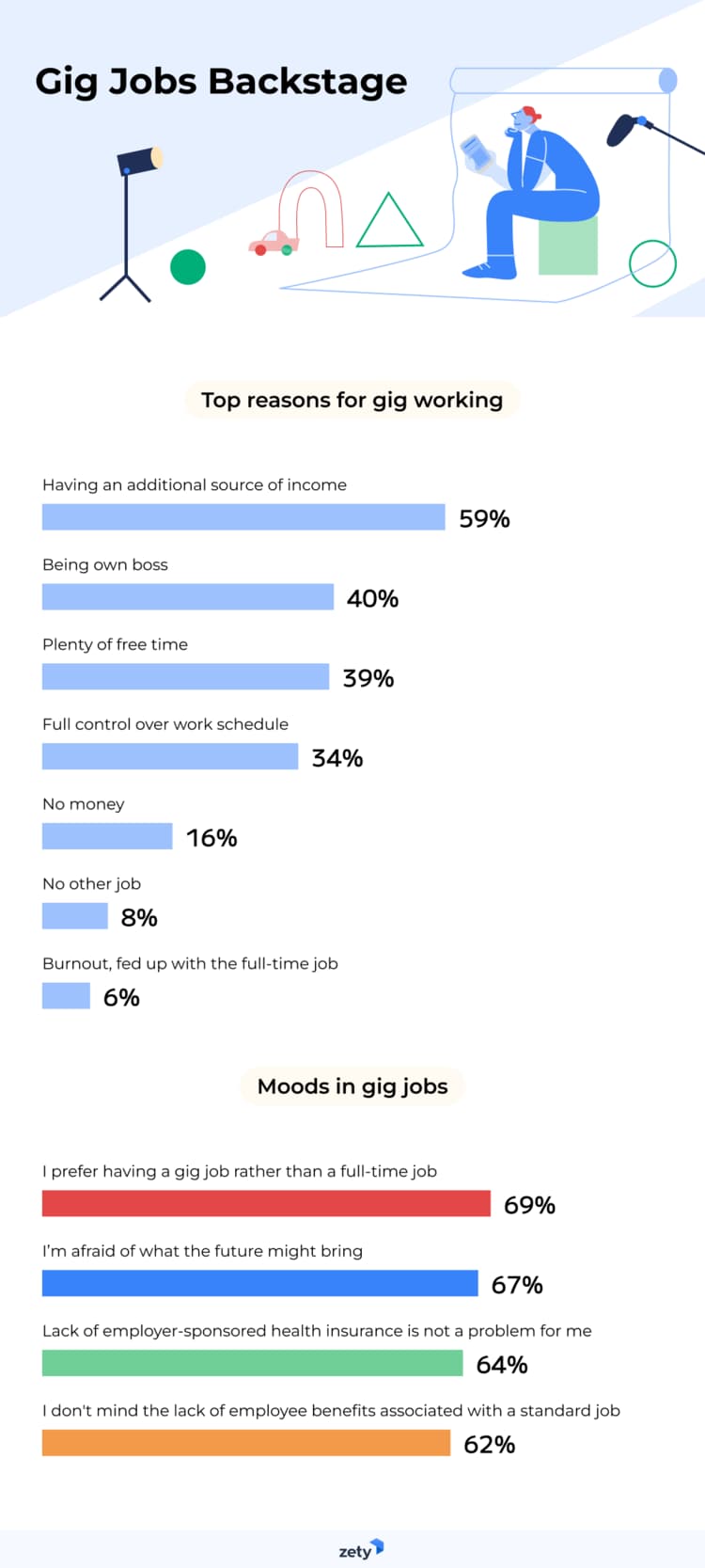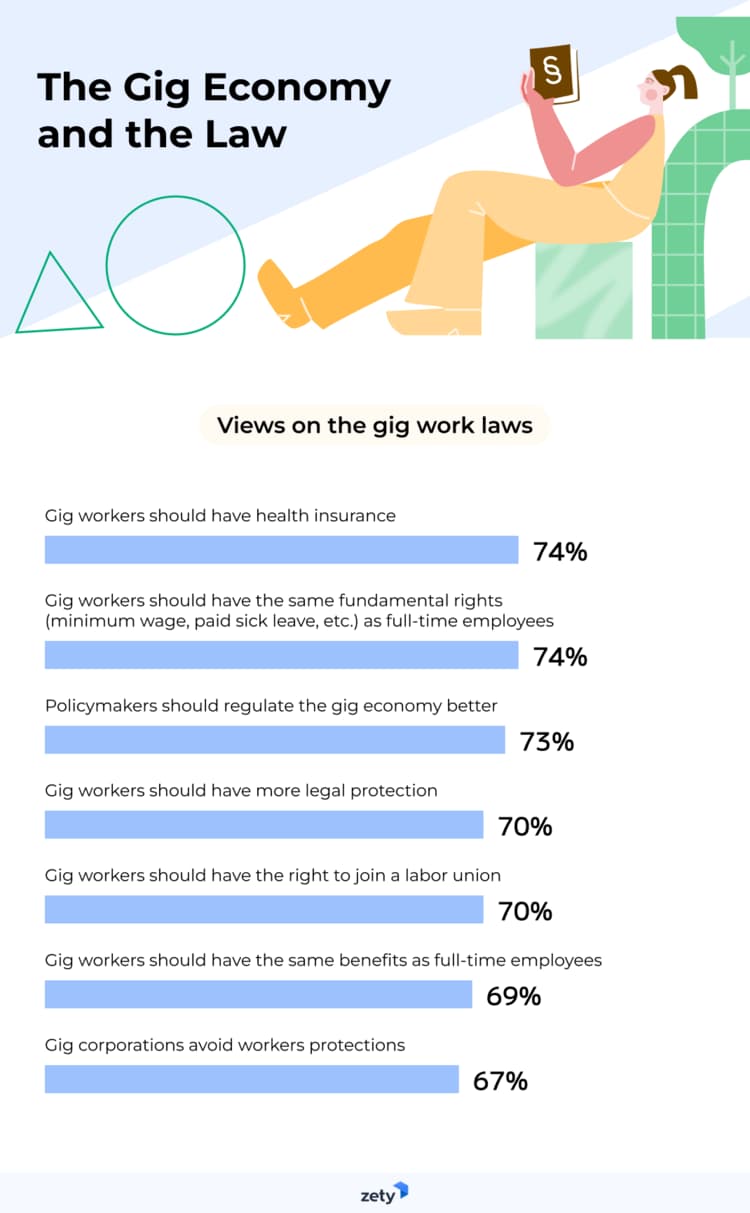Workers on the Gig Economy: 2022 Statistics
Create Your Resume Now
Applying for jobs is exhausting. Nerves, stress, emotional strain, demotivation.
But what if I told you it doesn’t have to be like that? What if I told you that you could easily get a job or several, work flexible hours, and earn according to your motivation on top of that?
It can be your reality, as such jobs exist. They’re called gig jobs. But they’re no El Dorado. They’re more Atlantis. You may sink if you are not careful.
To get to the bottom of the gig economy and aspects related to gig jobs, we polled 1,000 employees and explored the good and the bad about short-term and full-time contract work.
But first—
You've probably heard of them. But do you know what the gig economy and gig jobs actually are?
The gig economy in a nutshell
We all know someone who knows someone doing gigs. But do we know every aspect of the world of gig jobs?
Traditionally, the term “gig” was used by musicians, comedians, or other stage artists to define a performance engagement. But the emergence of freelance, short-term work quickly changed its meaning, giving it a new definition.
Let’s start with the border term, the gig economy. According to Cambridge Dictionary:
“The gig economy is a way of working that is based on people having temporary jobs or doing separate pieces of work, each paid separately, rather than working for an employer.”
Investopedia supplements this definition:
“The gig economy is based on flexible, temporary, or freelance jobs, often involving connecting with clients or customers through an online platform. The result of a gig economy is cheaper, more efficient services, such as Uber or Airbnb, for those willing to use them”.
Based on these, we can say that gig workers are independent and temporary contractors, but also project-based and on-call workers. Another defining factor of gig jobs is they don't offer workers permanent employment based on full-time contracts and stable salaries.
In recent years the terms “gig job” and “gig worker” has also become synonymous with working for digital platforms and mobile app companies. Examples are taxi-booking apps, deliveries, shopping platforms, running errands, or doing something else along those lines.
So, in a nutshell, gig jobs are the opposite of traditional full-time employment with legal protection of employees’ rights.
Let’s take a look at some gig work statistics:
- There are currently around 59 million gig workers. That's around 36% of all US employees.
- Statista projects that 85.6 million people will be doing freelance work in the US by 2027.
- According to Taskmo, demand for contract workers surged 66% in June 2022 compared to May.
- According to Thrivemyway.com, by 2023, the size of the gig economy could reach $455.2 billion.
- The ADP Research Institute says that in 6% of US companies gig workers make up as much as 85% of the workforce.
Regardless of whether you see those stats as fascinating or terrifying, they raise important questions about the future of the US gig economy. Here are a few that we're wondering about:
- In years to come, will gig jobs overtake traditional forms of employment?
- Will we say goodbye to "traditional" employment as we know it?
- Do we even want gig works to dominate the market?
Those and more are the questions we’re trying to find the answers to.
Workers in the gig economy

To get started, we asked our respondents if they were doing gig jobs out of choice or necessity. We suspected many employees might’ve been forced to take up gig work due to unfavorable life circumstances or poor financial conditions.
We discovered that 52% of respondents undertake gigs out of necessity. It's safe to assume that they would happily give it up if they could.
However, a similar share, 48%, are lucky enough to do gigs by choice. Additional money, willingness to save some extra cash, or simply too much free time—whatever the reason was, it’s based on the person’s own desire to take up a gig.
But whether you have to find a job or want to, work takes up much of your time.
For full-time-employed people between 25–54, the national average work week comes at 40.5 hours. Is it the same for gig workers? Well, no. Those who choose non-traditional employment tend to work fewer hours per week:
- 11% of gig workers spend 10 hours or less working per week.
- 38% devote 10–20 hours to work.
- 32% spend 20–30 hours fulfilling their duties.
- For 16%, work takes 30–40 hours a week.
- Only 3% spend 40 hours or more working.
Looking at these numbers, can we say that gig workers have a better work-life balance than full-time employees? Probably not, considering many do gigs as an additional form of employment and devote their spare working hours to it. So, in fact, gigs can become a burden.
Bearing that in mind, let's see how the future looks. Are gig jobs something respondents are considering in their employment plans for the next 12 months?
- 54% of respondents plan to find a full-time job but still want to do a gig job on the side.
- 24% plan to find a full-time job and resign from gig work.
- 16% want to stick to current gig jobs.
- 6% want to find another gig job.
Interesting, right? For the majority of respondents, gig jobs alone aren't enough. But let’s dig deeper.
Are gig jobs something that can be done for many years? Maybe even for your whole career? Before we find out the answer, let’s recall what gig jobs entail. Usually, no employment contract, fixed salary, or employee benefits. But remember, gig workers aren't just taxi drivers or delivery makers. These are also well-paid freelancers, corporate consultants, coaches, or specialists.
With that in mind, one may wonder how many workers would like to develop their gig careers up to retirement. And here’s the answer:
Are the safety and security associated with standard work not so compelling? Certainly, freelancers or independent specialists have better work opportunities or even higher salaries than people working for corporations under employment contracts.
So let’s ask another question. Gig work—something to praise or stay out of?
Two sides of the same gig
A job with no downside doesn’t exist. And even if it does, creative workers would still find some.
Look at doctors—long hours, night shifts. Lawyers—mental toughness is always in demand. Teachers—mental fatigue. Writers—lack of inspiration.
The same goes for gig jobs. Like any other profession, regardless of the industry, they have their bright and dark sides.

Let’s start with the positives. With our respondents’ help, we ranked the benefits of gig-based work:
- Independence – 58%
- Flexibility – 50%
- Variety of jobs to choose from – 43%
- Better opportunities to change jobs – 31%
- Easy to get any job – 28%
- No boss/manager – 22%
- No boredom, no repetitiveness – 19%
- Competitive wages – 18%
- Better quality of services – 15%
- No overtime – 15%
- Possibility to outsource some jobs/tasks – 7%
Competitive wages aren’t everything, right? Certainly, it’s not one of the most important factors people are looking for in gig jobs. The money was not even on the podium. But independence, flexibility, and variety were.
“The gig economy is empowerment. This new business paradigm empowers individuals to better shape their own destiny and leverage their existing assets to their benefit.”
Is money the drawback of gig jobs, then? Here's how our respondents ranked the disadvantages:
- Lack of employee benefits – 39%
- Irregular working hours – 37%
- Unstable income – 35%
- Added costs to personal expenses – 34%
- No insurance – 30%
- Stress due to uncertainty – 25%
- No days off/sick leave – 22%
- No work contract – 20%
- Bad work-life balance – 14%
- Unfair competition – 12%
Well, here we can say a bit more about money as it does make an indirect appearance. It’s more about income instability, though, rather than hourly wages.
And it’s actually a lack of traditional employment-related benefits that keep people up at night. The runner-up is irregular working hours, surely felt most by delivery or ride-hailing workers.
“Many delivery platforms do not provide social benefits to workers; they do not provide adequate working equipment or even resting facilities for workers. Workers often have no means of getting in touch with the human representative of a platform in any way. So there’s a lot of psychological stress involved with this prospect of maybe being cut off the job at any time.”
There’s no job without disadvantages. However, if you’re doing a gig job by choice, it’s easier to accept those gig-specific cons.
Negatives aside, maybe you're now more convinced by the pros of gig jobs? So much that you’re thinking about changing careers? Great! Let’s check out what industries are best for taking up a gig job and where you can easily find employment opportunities.
Gig industry

Did you think that gig work is limited to the transportation industry where Uber drivers work? Or maybe you assumed it was jobs related to deliveries? The opposite is true. As you can see, any industry is good for doing a gig job.
The most popular industries where respondents work are:
- IT and software – 37%
- Accounting and finance – 32%
- Art and design – 28%
- Administration – 27%
- Education – 24%
- Construction – 22%
- Freelance writing – 22%
- Animal care – 22%
- Deliveries – 22%
- Project management – 14%
- Maintenance – 14%
- Media and communications – 13%
- Transportation – 6%
IT and software seem to be the industry attracting the most gig workers. At the same time, deliveries rank in the middle of the list, while transportation is the least popular.
This shows how gig jobs are evolving. Therefore, they can't be understood as only app-based jobs, mostly driving or making deliveries. So we need to avoid associating gigs mainly with companies like Uber. What resonates most are the different faces of gig jobs containing freelancers, employees on B2B contracts, or specialists hired on project-based contracts. And IT and software are the best area for such.
However, whether in IT or delivery, a job doesn’t pop up for an employee just like that. It’s not the $5 you find on the street if you’re lucky. It has to be found somehow, after all.
And just like "regular" work there are online platforms and mobile apps offering gig job opportunities for everybody. And in fact, these are very popular ways to find gigs.
Not surprising, right? After all, we live in a heavily digital world, so where else can we look for a job if not on the Internet?
And now, let’s see the most popular platforms where gig workers find employment opportunities.
- Freelancer – 41%
- Amazon Flex – 37%
- Upwork – 33%
- Fiverr – 33%
- Guru – 26%
- Fancy Hands – 25%
- Uber or Uber Eats – 25%
- FlexJobs – 24%
- Lyft – 18%
- TaskRabbit – 15%
- DoorDash – 13%
- WAG – 9%
And the winners are Freelancer and Amazon Flex. According to our respondents, those are the two most popular platforms where any gig worker can secure a job. In third place, Upwork and Fiverr received the same number of indications from respondents. However, if you’re not looking for a pet-care-related job specifically, it might be a good idea to skip WAG altogether.
And who is most likely to use online gig platforms?
Now that you know which industry to choose and on which website you’re most likely to find a job, let's consider how many companies you’d like to work for. Yes, unlike traditional full-time employment, gig workers are far more likely to work for more than one employer.
Only 16% of gig workers work for one employer. The majority, 46%, have two employers. In turn, 30% work for three companies. The lowest share, 8%, makes a living cooperating with four or more companies.
The reasons? More work opportunities, work stability, and of course, more money. This brings us to the next chapter—money in the gig world.
Gig money

Discovering respondents’ financial health was essential to discuss the subject of the gig economy further. Thus, we asked respondents to describe their situation.
As a result, we discovered that:
- 26% are regularly unable to make ends meet.
- 60% make enough to cover necessary spending but have little savings.
- 14% have enough savings to cover emergency expenses and plan for their future.
It doesn’t look terrible, given that the vast majority (76%) can enjoy a relatively good standard of living.
And there are gig jobs to support their budgets or even make up the most significant part of them. What does it look like in practice?
41% of respondents admit that they’re doing gigs as side jobs. Having extra income is always a good thing. For the rest, 59%, a gig job is their main source of income.
But work means money. It's the main reason that most of us get out of bed every day. So the issue that everyone’s wondering about is what job to choose to earn well. Of course, your first thought will be to become a doctor or lawyer, not a freelance creative writer or independent business coach. But is it more profitable to do your job based on a traditional contract or as a gig work?
According to 61% of our respondents, having a traditional full-time job pays off in terms of money earned.
Yet still, a large group of respondents, 39%, believe that gig work can offer higher wages.
And actually, they’re both right. After all, salaries depend on your profession, education, years of experience, the amount of time you devote to the job, and much more. A well-educated lawyer working 60 hours a week is bound to earn more than a student devoting just 15 hours to driving an Uber. And the other way round, a freelancer committing most of the time taking on incoming jobs has better prospects than a demotivated shop assistant wanting to work fewer shifts.
However—
Let’s take a closer look and separate answers of those doing gigs as side jobs and those for whom gigs are the main source of income. Here's something thought-provoking.
The grass is always greener on the other side. Those fed up with traditional full-time jobs consider gigs as a better alternative. In turn, those tired of temporary jobs would like a standard job.
Whether people do gigs as a side job or their main source of income, gig money constitutes significant inflows to the budget.
- For 18% of respondents, gig money is essential, as they couldn’t live without it.
- For 70%, those funds are important, making up a significant share of the budget.
- Only 12% believe that gig money is supplementary and, therefore, nice to have but can get by without it.
Money. How often have we said or heard that “I earn a lot” or “I earn a little”? What exactly does it mean? Money is an abstract concept unless we focus on numbers. So let’s do that.
How much can people earn per hour doing gig jobs? (And let me remind you that the federal minimum wage for covered nonexempt employees is $7.25 per hour.)
- 34% earn between $9.99 and $14.99.
- A slightly less satisfied 29% of workers are paid $7.25 to $9.99 per hour.
- A happier 17% take home $15 to $19.99.
- 12% suffer the most, earning less than the minimum wage of $7.25.
- And the luckiest 8% cash in $20 or more per hour.
Any differences between people having a gig job as a side job or those having it as the main source of income? Let's take a look.
Gig work as a side job | Gig work as main job |
Less than $7.25 – 13% $7.25 to $9.99 – 33% $9.99 to $14.99 – 30% $15 to $19.99 – 15% $20 or more – 9% | Less than $7.25 – 9% $7.25 to $9.99 – 27% $9.99 to $14.99 – 37% $15 to $19.99 – 21% $20 or more – 5% |
Differences? Yes, but nothing striking. The majority, 33%, having side gigs earn from $7.25 to $9.99 or somewhere between $9.99 to $14.99 in the case of 30% of respondents. In turn, 37% having gigs as their main job have an hourly payout from $9.99 to $14.99. As expected, in both scenarios, the smallest percentage of workers earn less than $7.25—13% of people doing gigs as a side job and 9% of full-time gig workers.
We can safely say that money is one of the top reasons for doing gig work. But what are the other ones?
Gigs and what’s behind them

We presented respondents with a list of potential reasons and asked them to indicate why they decided to take up gig work. They were allowed to choose three options that reflected their motives. And here they are—the top reasons for gig working:
- In the first place, we have an undefeated winner, i.e., willingness to have an additional source of income – 59%.
- The runner-up is a desire to be your own boss – 40%. Not surprising considering the need for independence at work we all strive for.
- Every reason is good for taking up a gig work. But a great motivation is plenty of free time – 39%.
- Flexibility and deciding about one’s work are also desirable. So, what also ranks high is having full control over your work schedule – 34%.
- And again, money, or a lack of it. No money – 16%. Gig work is a good way to find an additional source of income.
- No other job – 8%. Well, yes, being unemployed seems to be a perfect reason.
- And last but least. Burnout, feeling fed up with a full-time job – 6%.
Here, money is everything. But cash doesn’t change the opinions and attitudes employees have toward the gig industry. And the mood there is ambiguous.
- Despite all the cons, the gig form of employment is compelling. 69% prefer to have a gig job rather than a full-time job.
- At the same time, 67% fear what the future might bring. The chances are that those fears are related to inflation and recession.
- For the majority, one of the disadvantages of gig-based jobs isn’t actually a disadvantage. 64% of respondents say that lack of employer-sponsored health insurance is not a problem for them.
- Similarly, 62% don’t mind the lack of employee benefits associated with a standard job.
Summarizing the above, we can say that employees have a relatively positive attitude toward the gig industry. Their only concerns aren't directly related to the gig form of employment but rather to the general economic situation.
Let’s dive deeper and learn more about work satisfaction and negative work experience. And we’ll bring up the subject of money again.

Overall job satisfaction looks great. Gig workers are satisfied with their:
- current job – 71%
- working conditions – 72%
- employer/job provider – 73%
- salary – 70%
Work is a significant aspect of our life, which affects our private life, well-being, as well as life balance. It's necessary, therefore, to be satisfied with your professional career.
So let’s now focus on money for a while again. Financial health strongly influences our job satisfaction. So what do gig workers have to say?
- 73% are satisfied with the amount of money they earn.
- 69% can afford non-essential spending, e.g., going to the cinema or having dinner at a restaurant.
- 69% earn enough to cover emergency spending, e.g., car repairs.
- 67% can pay bills without difficulty.
- 66% feel financially secure.
There's more to gig jobs than they give them credit for. Isn’t there?
Let’s now move to the dark sides. As part of our research, we asked respondents if they had ever encountered inappropriate behavior while doing the job. We found that:
- 88% had at least once been mistreated when completing a job. 10% of respondents indicated that they often experience mistreatment, 52% that it sometimes happens, while 26% admit instances of abuse take place rarely. Those who never experienced mistreatment while at work amount to 12%.
- 81% at least once felt unsafe when completing a job. 11% of research participants admit they often feel unsafe, 45% say it sometimes happens, while 25% admit that it occurs rarely. 18% of respondents said they never felt unsafe.
- 70% at least once experienced sexual advances when completing a job. 10% of survey takers say it takes place often, 39% confess sexual advances sometimes happen, while 21% declare that such situations rarely take place. For 34%, such situations have never occurred.
Mistreatment can happen no matter what your job is. We may not always feel safe in every job or avoid encountering sexual advances. Though we definitely should feel safe in every job.
However, from the point of view of gig jobs, it's important to pay more attention to treating employees fairly, ensuring their psychological comfort and safety, and minimizing situations that expose them to danger and stress.
Is this a task for the government and the legal system?
Gig laws

The gig economy raises questions about employee classification, legal protection, taxes or rights, and fair treatment. And, there’s no doubt that the contribution of gig workers to the economy will continue to increase. Therefore, as with any other industry or job, the gig economy should also be regulated.
And this is what respondents think:
- According to 74% of respondents, gig workers should have employer-provided health insurance.
- In the opinion of 74%, gig workers should have the same fundamental rights as full-time employees.
- 73% of research participants confess that policymakers should regulate the gig economy better.
- 7 in 10 respondents (70%) believe that gig workers should have more legal protection.
- The same percentage of people, 70%, say that gig workers should have the right to join a labor union.
- Again, a similar share, 69%, think that gig workers should have the same benefits as full-time employees.
- 67% believe that gig corporations avoid workers' protection.
With more people deciding to choose this form of employment, policymakers will undoubtedly have to address the legal protection of gig workers. Many jurisdictions are now considering what steps to take to deal with the classification of gig workers and the inadequacy of the traditional definitions of employees and employment.
“The key issue is that gig workers who are classified as self-employed and not employees do not enjoy the same legal rights and protections as other traditional permanent employees. This can include rights to claim unfair dismissal, the right to sick pay and paid holiday and the right to benefit from certain social security protections or retirement provisions. It can also impact on the right to collective representation. As more individuals are becoming aware of these potential rights, we are seeing more claims by workers against the providers for inappropriately classifying them as contractors or self–employed.”
The Biden administration has indeed been focusing on protecting workers’ rights in the gig economy. In May 2021, the government blocked the Trump administration’s law that would’ve made it easier to classify gig workers as contractors rather than employees to the benefit of companies like Uber and the harm of workers. As a result, states started to revise their policies and introduce law reforms. California, for example, introduced Assembly Bill 5, a law that requires employers to follow strict classifications for employers and workers.
But from the legal point of view, the situation isn’t so simple. Legal classification is not everything. As Shelly Steward, the director of the Aspen Institute’s Future of Work Initiative, points out, “there’s the need to address the broader job quality issues. Even if gig workers were classified as employees, theirs wouldn’t all be good jobs; they would still face issues of low and unpredictable earnings.”
However, as Steward adds, we need to be “cautiously optimistic that we will see some changes.”
Key takeaways
Just a quick summary before we return to our gig or standard job duties. Here’s a recap of our key findings:
- The percentage of people doing gig jobs voluntarily and those forced to take up gigs by life situations is almost equal, 48% vs. 52%.
- Average gig workers devote 10–20 hours per week (38%) or 20–30 hours (32%) to fulfilling their job duties.
- 54% of respondents plan to find a full-time job but still want to do a gig job on the side.
- 88% of respondents would consider doing the gig job until retirement.
- The top three advantages of gig jobs are independence (58%), flexibility (50%), and a variety of jobs to choose from (43%).
- The top three disadvantages of gig jobs are lack of employee benefits (39%), irregular working hours (37%), and unstable income (35%).
- The best industries to undertake gigs are IT & software and accounting & finance.
- 94% of gig workers use online platforms or mobile apps to secure gigs. The most popular platforms are Freelancer, Amazon Flex, Upwork, and Fiverr.
- 84% of gig workers work for more than one company.
- For 59%, a gig job is their main source of income.
- The majority of gig workers, 34%, earn somewhere between $9.99 to $14.99 per hour.
- 88% of survey respondents had at least once been mistreated when completing a job. 81% at least once felt unsafe, while 70% at least once experienced sexual advances.
- The vast majority of respondents believe that gig workers should have: more legal protection, the same fundamental rights as full-time employees, and employer-provided health insurance.
Methodology
We surveyed 985 unique respondents via a bespoke online polling tool. All respondents included in the study passed an attention-check question. The study was created through research, crowdsourcing, and surveying.
Limitations
The data we are presenting relies on self-reports from respondents. Each person who took our survey read and responded to each question without any research administration or interference. There are many potential issues with self-reported data like selective memory, telescoping, attribution, or exaggeration.
Some questions and responses have been rephrased or condensed for clarity and ease of understanding for readers. In some cases, the percentages presented may not add up to 100 percent; depending on the case, this can be due to rounding, or due to being part of a larger statistic, or due to responses of "neither/uncertain/unknown" not being presented.
Fair use statement
We’d love you to share our findings. All we ask is that you link back to this page and make it possible for our authors to boast about the success of this article in their resumes.
Sources
- Cambridge Dictionary, “Gig economy”
- Chacko, T.I., “Job And Life Satisfactions: A Causal Analysis Of Their Relationships”
- Govaert, M., “Global Employment Law: How the Gig Economy is reshaping labour markets”
- Investopedia, “Gig economy”
- Lalwani, P., “ADP Research Institute’s Recent Report Says Gig Work Is Here to Stay”
- Lutkevich, B., “What is the gig economy?”
- Mazur, C., “What is the average work hours per week?”
- Mizrahi, O., “The Gig Is Up: Thrive in the Gig Economy, Where Old Jobs Are Obsolete and Freelancing Is the Future”
- Orpen, C., “Work and Nonwork Satisfaction: A Causal-Correlational Analysis”
- Pew Research Center, “The State of Gig Work in 2021”
- Ro, Ch., “Why gig work is so hard to regulate”
- Schmitt, N., and Mellon, P.M., “Life and job satisfaction: Is the job central?”
- Statista, “Number of freelancers in the United States from 2017 to 2028”
- The Economic Times, “Contract hiring for gig workers jumps before festive season: Report”
- Todorov, G., “Impressive Gig Economy Stats and Trends 2022”
About Zety’s Editorial Process
This article has been reviewed by our editorial team to make sure it follows Zety's editorial guidelines. We’re committed to sharing our expertise and giving you trustworthy career advice tailored to your needs. High-quality content is what brings over 40 million readers to our site every year. But we don't stop there. Our team conducts original research to understand the job market better, and we pride ourselves on being quoted by top universities and prime media outlets from around the world.
